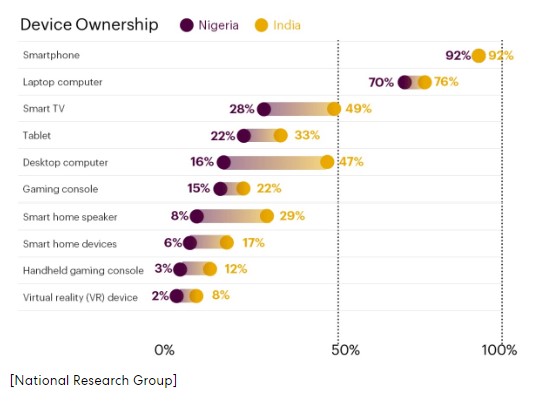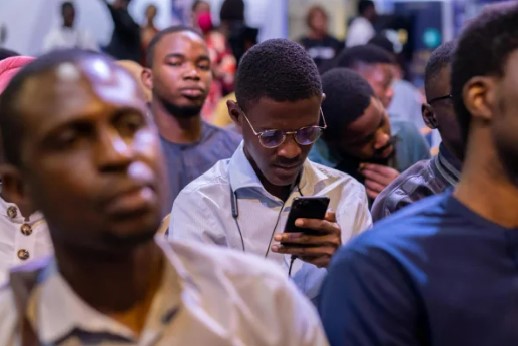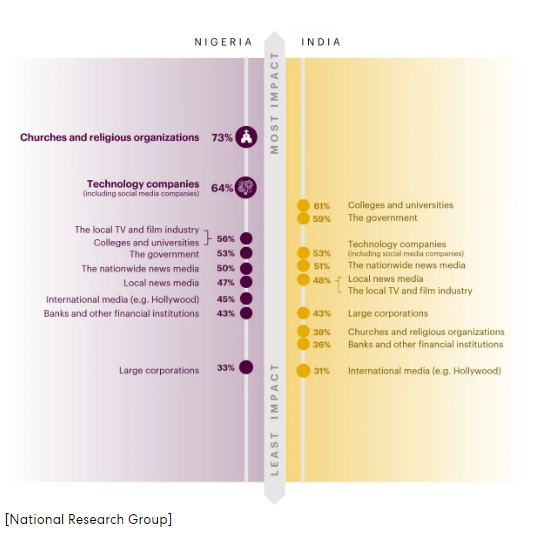In the News
In Nigeria, Big Tech, crypto, and hustle culture come calling
By
Connie Lin,
Fast Company
CONTACT
hello@stagwellglobal.com
SIGN UP FOR OUR INSIGHTS BLASTS
Nigeria sits at Africa’s heart: Geographically, it’s nestled middle-left of the curve in the kidney bean-shaped land mass, and its economy boasts the highest GDP on the continent (nearing $450 billion in 2021). The pulse of the country beats with the pace of rapid transformation. It harbors the world’s sixth-largest population, which is also among the fastest growing, projected to surpass the United States by 2050.
It’s a country of strivers, on the verge of reinventing itself—and it has fluxed socially and culturally in recent years. But one constant anchor is the promise of the internet in delivering a better future, reveals a new report from the National Research Group (NRG), a division of global marketing firm Stagwell.
Over the summer, NRG partnered with a media agency based in Lagos, the country’s largest city, to dive deep into the Nigeria’s shifting landscape—one that, despite its position at the heart of Africa, is still a mystery to much of the Western world (if not to the East—where it has caught the eye of economic powerhouses like China, which has poured millions into Nigerian infrastructure to cement strategic trade partnerships).
The report is the first in a series focusing on high-growth emerging markets, and draws from a June-July survey of 5,000 Nigerian consumers, ages 16 to 64, whose responses were interwoven with commentary from academics and industry experts. It sketches the portrait of a country reenergized by young blood, that has lagged on technological development in many ways, but now hopes to leapfrog into the digital race.
NEW DIGITAL NATIVES, CONNECTED BY SMARTPHONES
First and foremost, it notes: Nigeria runs on mobile technology. According to the data, 92% of people in the country own a smartphone, and the device dominates as a mode of entertainment for most. Over half (55%) of all TV shows and movies are watched on smartphones, and the vast majority (83%) of gaming is played on them as well. As NRG’s content and strategy executive Kerri Norton explains to Fast Company, this is partly out of economic necessity. Some Nigerians don’t have other devices for streaming. Laptop ownership is at 70%, and desktop computer ownership is significantly lower at 16%. Less than 30% own tablets or smart TVs, and only 15% own gaming consoles.

But beyond that, mobile is a godsend for Nigerians living with the state’s still relatively poor electricity infrastructure, says Samuel Odusami of SBI Media, the Nigeria-based agency that served as NRG’s local partner on the ground. “Because [Nigerians] don’t have access to uninterrupted power 24/7, mobile technology has become their savior,” says Odusami, adding that power-bank businesses have boomed in Nigeria, helping many stay wired to the internet for longer, on the road or at home, when the grid is down.
Consequently, the often-slow speed of internet is viewed as the biggest tech problem in the market, one that many hope the 5G revolution will solve. Nearly 70% of those surveyed are aware of the impending 5G rollout, and 81% of Nigerians believe it will “transform my country for the better.” In rural and low-income communities, where internet connections are spottiest, many believe 5G offers a chance to “catch up,” as faster streaming translates into more business productivity, the report notes.
“It’s a democratization of access across all socioeconomic classes,” says Anas Ghazi, Stagwell’s chief strategy officer. “It’s allowed for an entrepreneur mindset, as Nigeria [pursues] its largest revenue generation in the next five years.”
THE SKITMAKER HUSTLE
That entrepreneurial spirit of capitalism and “hustle culture” has long reigned in Nigeria, even as unemployment rates increased and the economy struggled. But now, it’s being supercharged by Nigeria’s largest population of youth in the world—skewing the country’s median age to just 18 years old—who have seized upon the internet as a way out of the well. “It’s a window of opportunity for young people,” says Odusami, who cites a rising generation of so-called skitmakers as proof.
Nigerian skitmakers create social media content, but they do it without the popular influencer luxuries—studios to shoot videos, or pricy tools for animation—choosing to invest only in a high-end smartphone, perhaps an iPhone or Samsung Galaxy, to stitch together content for YouTube, TikTok, and other platforms.
The goal is to go viral, and many have flocked to try. The country now has a nest of creators numbering in the thousands—including some with millions of views, says Odusami—who have used their success as a springboard to start full-fledged production companies, even in the mainstream movie industry. Collectively, skitmaker startups employ close to 5,200 people, he says. Among the most prominent is Mr Macaroni, who broke through with YouTube comedy and now tours the world promoting Nigerian issues.
For those who don’t strike it big, skitmaking might be just one of many enterprises. “Even people with 9 to 5 jobs have what we call ‘side hustles,’” says Odusami. “In Nigeria, you can’t [support] a family without multiple streams of income.” They might start blogs or YouTube channels, or they might start a business that has nothing to do with social media—but the internet remains a through line. Learning to code, or leveraging e-commerce to sell Nigerian cuisine in foreign countries, are among the examples he cites.
But despite the hustle, Nigerians still feel “behind” on tech development, NRG’s report finds. Only one in three survey respondents said their country was currently “very innovative,” compared to over half of respondents in India, which served as a pseudo-control group for the study.
According to Odusami, Nigerians hope the grind can help bridge the gap. “They are hungry to feed themselves,” he says. “Hungry to make a name, hungry to become financially independent.”

CRYPTO UNLOCKED
As businesses grew, Nigerians needed a way to accept payments globally—something that wasn’t possible with PayPal, Google Pay, or other legacy platforms. That ignited a boom in enthusiasm for cryptocurrencies and blockchain technology, one that has dwarfed awareness of crypto in the United States. In Nigeria, 90% responded that they were aware and knowledgeable about cryptocurrencies, while 71% said the same for the blockchain and 59% for NFTs. (In a November 2021 Pew Research report, only 24% of Americans said they had heard “a lot” about crypto.)
“Now you have businesses who accept payments in crypto, in stablecoins like USDC and Binance Coin,” says Odusami. But even as people began to adopt crypto for everyday goods like groceries and taxi rides, the Nigerian government’s central bank in 2021 began to restrict Bitcoin services in the country. According to a recent joint report from the Organisation for Economic Co-Operation and Development (OECD) and the United Nations, the crackdown crippled “millions of young Nigerians” who were making money from crypto trading. However, the report also suggested that some found a way to “lawfully bypass these restrictions and continue the business.” The same month, crypto exchange KuCoin reported that 33 million Nigerians had owned or traded crypto in the last half year.
According to Odusami, 20 to 30 global crypto exchanges have a presence in Nigeria and are actively targeting Nigerian customers—including Binance, which is a client of SBI Media in five African countries.
Meanwhile, the hustle has moved onto the blockchain. Odusami cites the story of a Nigerian man who created his own NFT project from photos of drummers at a traditional Nigerian wedding ceremony—a cultural rite beloved not just in dance, but also as a musical retelling of the betrotheds’ mothers and fathers through the years. The man made a killing—and returned to the ceremonial village to give the drummers 70% of the proceeds.
BIG TECH’S SWAY
According to the survey, Silicon Valley Big Tech companies (including social media) wield tremendous influence in Nigeria, with their command of the culture second only to religious institutions. It tops that of colleges and universities, as well as the government, and both Hollywood and Nollywood.

It’s perhaps no surprise that giants of crypto and social media—which have speckled reputations in the States—are viewed much more positively in Nigeria, because, as Norton explains, the impact of both technologies within the country has been overwhelmingly positive. It offers freedom of entrepreneurship and liberation from circumstances, a lifeline that keeps Nigerians afloat, and working, and connecting with the rest of the world. It might even have the power to combat corrupt governments and state overreach.
But Nigeria is young, and it will still have to fight for its place in a competitive world. “Nigeria is on the map to grow significantly over the next 10, 15, even 5 years,” says Norton. “They want to be where the future is.”
So, it hustles on.
Related
Articles
In the News, Press Releases
Jul 09, 2025
STAGWELL LAUNCHES STAGWELL MEDIA PLATFORM (SMP), A CENTRALIZED TEAM OF GLOBAL MEDIA, TECHNOLOGY AND DATA INVESTMENT EXPERTS

Artificial Intelligence, In the News, Marketing Frontiers, Press Releases, Stagwell Marketing Cloud, Tech
Jun 12, 2025
PRophet, a Stagwell (STGW) Company, Completes Integration of UNICEPTA, Launches Unified Brand and Enhanced Media Intelligence Offering

In the News, Marketing Frontiers, Press Releases, Stagwell Marketing Cloud, Tech
Jun 11, 2025
The Marketing Cloud Launches Cutting-Edge Platform to Simplify Marketing Workflows





